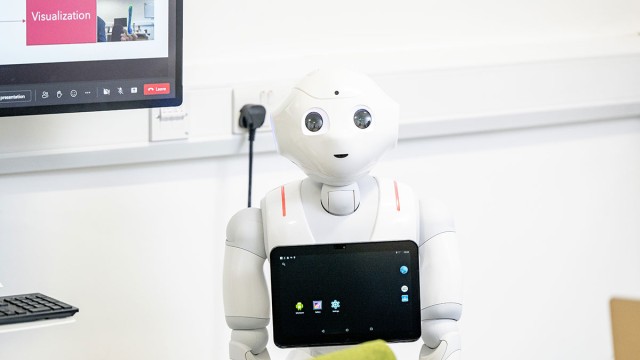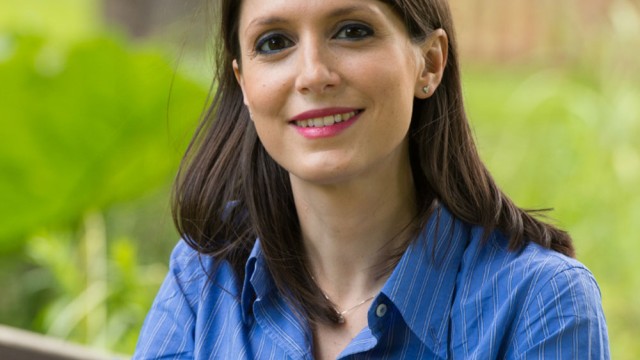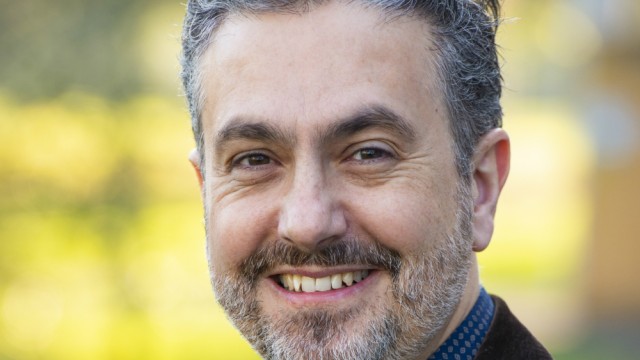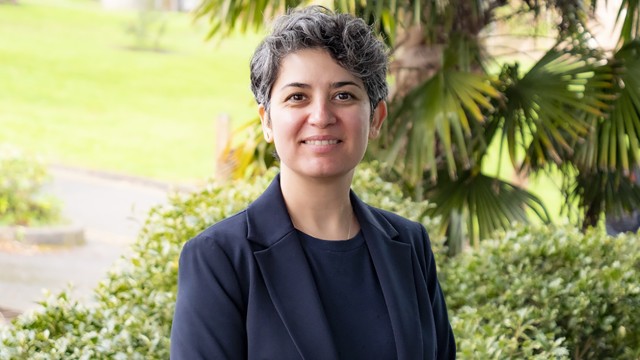
- AI-Enabled Digital Accessibility (ADA)
PhD AI-Enabled Digital Accessibility (ADA)
Our AI-enabled Digital Accessibility (ADA) PhD programme supports pioneering research in merging AI advancements with human expertise - to improve digital accessibility for all, regardless of age, language, cognitive and sensory abilities. ADA will nurture the next generation of leaders in AI-enabled digital accessibility, uniting experts in engineering, computer science, social and cognitive science, and language, translation and design studies.
Why choose this
programme?
- Join the Leverhulme-funded Doctoral Scholarships Network for AI-enabled Digital Accessibility (ADA) - the first centre of its kind in the world.
- Work in cutting-edge research facilities including Behavioural Science laboratories for physiological measurements such as eye tracking, a High-Performance Compute cluster for data-driven projects and an immersive media production studio to support experimentation with the creation of accessible audiovisual media.
- Be at the forefront of an emerging and exciting discipline that will spearhead new approaches across a variety of fields, shaping the future of AI-enabled accessible digital media
- Enhance the understanding of accessibility at its conceptual core and explore diverse methods, combining human expertise with AI progress, to deliver and implement accessibility solutions tailored to diverse user needs.
- Surrey is ranked in the top 20 for the quality of our research outputs (Research Excellence Framework (REF) 2021).
What you will study
Our ADA PhD gives you the opportunity to undertake an interdisciplinary research programme in conceptual, experimental and/or applied areas of AI-enabled digital accessibility.
You could explore a topic such as:
- Meaningful image/video -to-speech/text accessibility through AI
- Meaningful speech-to-text accessibility through AI
- Improving text comprehension and simplification through AI
- Tools for meaningful cross-language ADA, especially low-resource languages
- Enhancing assistive technology through AI
- Developing novel methods to personalise ADA
As a PhD student, you’ll become part of Surrey’s Leverhulme-funded Doctoral Scholarships Network for AI-enabled Digital Accessibility (ADA-DSN), putting you at the heart of a community of academics, postdoctoral researchers, industry representatives and advocates in this emerging field. During your PhD, you’ll embark on a training programme including interdisciplinary seminars, bespoke lectures, tutorials and masterclasses, student-centred workshops, and activities focused on developing interdisciplinary, cohesion, integration, team-working, team-building and practical skills. These workshops are designed to meet individual training needs, strengthen existing and acquire new skillsets, develop personal training plans and consolidate project plans.
Please note: Studentships and PhD topics are subject to availability as places are limited.
Assessment
Your final assessment will be based on the presentation of your research in a written thesis, which will be discussed in a viva examination with at least two examiners. You have the option of preparing your thesis as a monograph (one large volume in chapter form) or in publication format (including chapters written for publication), subject to the approval of your supervisors.
After your first 12 months, you’ll complete a confirmation report, which will be assessed by independent examiners.
Location
This course is based at Stag Hill campus. Stag Hill is the University's main campus and where the majority of our courses are taught.
Research projects
For our first PhD cohort, we invite proposals for innovative and original projects that align with the themes and outlines presented below:
THEME 1: Meaningful image/video-to-speech/text accessibility through AI
Outline: Automating audio description for short-form video: user preferences and priorities
Digital media often feature short-form video, including news or social media clips, animations. However, such video clips often lack audio description (AD) for people with sight loss, especially in user-generated content. While AI technology may have the potential to address this gap, current AI-generated descriptions of visual content lack in sophistication, nuance, and narrative coherence. Short video clips with low narrative complexity offer a starting point for experimenting with automated AD. We invite proposals that explore how AI-generated descriptions of visual content can be shaped to make short-form video accessible for people with sight loss. The project should involve eliciting user needs, preferences, and priorities, as well as experimenting with prototypes of AI-generated description to identify areas of challenge and direct further development.
THEME 2: Meaningful speech-to-text accessibility through AI
Outline: Mapping speech-to-text accessibility needs across diverse audiences
Speech-to-text (STT) services, such as subtitles and transcription, are vital for accessibility.
Despite its increasing popularity on TV, video platforms and social media, implementing STT in real-time and into another language remains a complex problem, which cannot be addressed by technology alone. Fundamental questions need to be explored before personalised and context-specific solutions acknowledging diverse user needs can be developed. We invite proposals focusing on conducting audience reception studies with different types of user groups and/or digital media to identify relevant quality parameters to integrate the ones currently used (mostly accuracy and latency) as well as users’ expectations on a service that is meant to go cater for people with different needs. This project should complement and pave the way for more experimental, comparative studies across different workflows/configurations/digital materials.
THEME 3: Improving text comprehension and simplification through AI
Outline: Investigation of prompting techniques for text simplification
Large language models have been shown to be capable of simplifying texts when prompted to do so. However, in most cases the prompts are designed in an ad-hoc manner and do not effectively convey the needs of end users. We invite applications for a PhD project focused on developing a meta-language for writing prompts which can be used to facilitate text simplification. Ideally, this meta-language should be adaptable to any category of users, but the PhD project should focus on and involve specific user groups. Techniques such as prompting chain of thoughts and generating multimodal content may also be explored within this project, as long as they contribute to the development of the framework.
THEME 4: Tools for meaningful cross-language ADA, especially low resource languages
Outline: Identifying user needs for AI-enabled language access to digital health information
Many healthcare institutions have turned to AI-driven solutions to make digital health information accessible to diverse linguistic groups. However, the language support provided on healthcare-related websites and by digital health apps, often through machine translation, may lack verification, leading to potential misinformation and miscommunication, especially for languages with underdeveloped machine translation capacity. We invite PhD projects investigating accessibility biases for speakers of minority languages in healthcare digital media. We encourage research adopting a user-centred approach to analysing and evaluating the use of machine translation of healthcare websites and apps. The project should involve speakers of minority/low resource languages to understand their needs and preferences, as a stepping stone towards enhancing language access and equality without introducing further risks.
THEME 5: Enhancing assistive technology through AI
Outline: Exploring preferences regarding AI-based solutions to accessibility of textual information for people living with dementia
It can be difficult for people living with dementia to access information presented in complex texts. Existing guidance emphasises the importance of a clear layout, highlighting key points and careful use of images, but acknowledges that no single solution works for everyone. AI holds promise for assisting people living with dementia in accessing information, for example, by automatically adapting written text formats or shifting from written text to speech. AI offers the prospect of flexible solutions that adapt to changing needs. It is not clear, however, how AI-based accessibility tools can be flexibly deployed, and to what extent users would wish AI to make decisions on their behalf. This project would work with potential users to explore their insight into how AI solutions should acquire and act on user feedback to improve information accessibility for people living with dementia. We invite projects using qualitative research methods to build a design brief for AI-based textual accessibility.
THEME 6: Developing novel methods to personalise ADA
Outline (a): Benchmarking AI-enabled accessibility
The proliferation of digital media content has increased the demand for different modalities of audiovisual translation to ensure accessibility for users with diverse needs. Digital media providers are turning to AI-driven solutions to manage this demand and meet legislative requirements. Although achieving human-level sophistication through automated approaches remains challenging, initial explorations of AI-generated accessible content indicate potential benefits for users, provided minimum thresholds for accuracy and intelligibility and other aspects are met. Amidst the emerging blend of human, machine-assisted and fully automated methods for creating accessible content, user-centric evaluation is essential, regardless of production method. We invite projects that develop a unified framework for evaluating and benchmarking one specific type of accessible content (e.g., audio described content, or content adapted for neurodiverse people), with a view to extending this framework to other modalities in the future.
Outline (b): ADA-Learn: Few-shot meta-interpretive learning for personalised digital accessibility
Most current machine learning approaches for modelling user requirements and behaviour need large amounts of training data and the learned models are only suitable for the ‘average’ users (one-size-fits-all assumption). However, personalised digital accessibility requires machine learning algorithms that can build models from a small number of interactions with the user without the need for prior training or transfer learning (which could include implicit biases). We invite projects that aim to develop the theory and implementations for efficient learning from small data using Meta-Interpretive Learning (MIL) and in particular Meta-Inverse Entailment (MIE). MIE is a novel explainable few-shot learning approach developed at Surrey, which has been already used for learning accurate descriptions of complex concepts from single examples. Successful projects will extend MIE for explainable few-shot meta-interpretive learning for personalised digital accessibility.
Supervision
As a PhD student, you will be supervised by a unique world-class team of researchers from different disciplines who are experts within a wide range of theoretical and methodological skills. Depending on your specific project, your supervisory team will be multi-disciplinary and you will benefit from the knowledge and insights from multiple disciplines within the University, including the Centre for Translation Studies (CTS), the Centre for Vision, Speech and Signal Processing (CVSSP) and Nature Inspired Computer and Engineering Research Group (NICE).
In addition, the Network will benefit from contributions by Surrey's Institute for People-Centred AI (PAI), Digital World Research Centre (DWRC), Digital Societies and Brain and Behaviour research groups.
Your designated team of supervisors and co-supervisors, tailored to your specific project, will help you define the scope and objectives of your research, and help you ‘fill in the gap’ where needed to gain the skills necessary to bring complete your research.
For a complete list of supervisors, see section below.
Research centres and groups
Research support
The professional development of postgraduate researchers is supported by the Doctoral College, which provides training in essential skills through its Researcher Development Programme of workshops, mentoring and coaching. A dedicated postgraduate careers and employability team will help you prepare for a successful career after the completion of your PhD.
UK qualifications
Applicants are expected to hold a first or upper-second-class (2:1) UK degree in a relevant discipline (or equivalent overseas qualification), or a lower-second (2:2) UK degree plus a good UK master’s degree – distinction normally required (or equivalent overseas qualification).
English language requirements
6.5 or above (or equivalent) with 6.0 in each individual category and at least 7.0 in the writing component.
These are the English language qualifications and levels that we can accept.
If you do not currently meet the level required for your programme, we offer intensive pre-sessional English language courses, designed to take you to the level of English ability and skill required for your studies here.
Selection process
Selection is based on applicants:
- Meeting the expected entry requirements
- Being shortlisted through the application screening process
- Completing a successful interview
- Providing suitable references.
Fees per year
Explore UKCISA's website for more information if you are unsure whether you are a UK or overseas student. View the list of fees for all postgraduate research courses.
* Please note: any start date other than September will attract a pro-rata fee for that year of entry (75 per cent for January, 50 per cent for April and 25 per cent for July).
October 2025 - Full-time
- UK
- £5,006
- Overseas
- £21,000
October 2025 - Part-time
- UK
- £2,503
- Overseas
- £10,500
January 2026 - Full-time
- UK
- £3,755
- Overseas
- £15,750
January 2026 - Part-time
- UK
- £1,877
- Overseas
- £7,875
- Annual fees will increase by 4% for each year of study, rounded up to the nearest £100 (subject to legal requirements).
Additional costs
There are additional costs that you can expect to incur when studying at Surrey.
Funding
Doctoral Studentships will be available for this programme through the ADA Leverhulme Doctoral training network. Additional funding is available for Masters Plus Doctoral Scholarships for students from underrepresented groups. For further information, please email Professor Sabine Braun: s.braun@surrey.ac.uk.
A Postgraduate Doctoral Loan can help with course fees and living costs while you study a postgraduate doctoral course.
How to apply
Please apply online and submit the following:
A research proposal for one of the above research projects projects that:
- Fits with one main theme – please indicate your designated theme number (and outline in the case of THEME 6)
- Is structured as follows:
- ‘My take on the topic’
- Research questions
- Theoretical framework
- Methodologies
- Significance of the research
Word limit: 1,000 words
An applicant motivation letter that:
- Demonstrates fit to project
- Highlights career development aims.
Word limit: 500 words
Application deadline: 13 October 2024
After registration
Students are initially registered for a PhD with probationary status and, subject to satisfactory progress, subsequently confirmed as having PhD status.
About the University of Surrey
Need more information?
Contact our Admissions team or talk to a current University of Surrey student online.
Code of practice for research degrees
Surrey’s postgraduate research code of practice sets out the University's policy and procedural framework relating to research degrees. The code defines a set of standard procedures and specific responsibilities covering the academic supervision, administration and assessment of research degrees for all faculties within the University.
Download the code of practice for research degrees (PDF).
Terms and conditions
When you accept an offer to study at the University of Surrey, you are agreeing to follow our policies and procedures, student regulations, and terms and conditions.
We provide these terms and conditions in two stages:
- First when we make an offer.
- Second when students accept their offer and register to study with us (registration terms and conditions will vary depending on your course and academic year).
View our generic registration terms and conditions (PDF) for the 2024/25 academic year, as a guide on what to expect.
Disclaimer
This online prospectus has been published in advance of the academic year to which it applies.
Whilst we have done everything possible to ensure this information is accurate, some changes may happen between publishing and the start of the course.
It is important to check this website for any updates before you apply for a course with us. Read our full disclaimer.





























